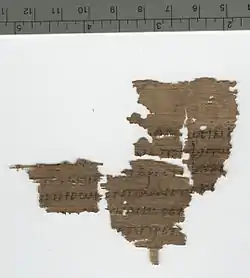1 Corinthians 14
1 Corinthians 14 is the fourteenth chapter of the First Epistle to the Corinthians in the New Testament of the Christian Bible. It is authored by Paul the Apostle and Sosthenes in Ephesus. In this chapter, Paul writes about the gift of prophesy and about speaking in tongues. Biblical scholar F. Dale Bruner states that "edification becomes the theme of this chapter: in Paul's thought, the ultimate criterion for a gift of the Spirit is this: Does it upbuild the church?"[1]
| 1 Corinthians 14 | |
|---|---|
 1 Corinthians 14:31-34 in Papyrus 123 from the 4th century. | |
| Book | First Epistle to the Corinthians |
| Category | Pauline epistles |
| Christian Bible part | New Testament |
| Order in the Christian part | 7 |
Text
The original text was written in Koine Greek. This chapter is divided into 40 verses.
Textual witnesses
Some early manuscripts containing the text of this chapter are:
- Codex Vaticanus (AD 325–350)
- Codex Sinaiticus (330–360)
- Papyrus 123 (4th century; extant verses 31–34)
- Codex Alexandrinus (400–440)
- Codex Freerianus (~450; extant verses 12–13, 22, 32–33)
- Codex Claromontanus (~550)
Verse 2
- For he that speaketh in an unknown tongue speaketh not unto men, but unto God: for no man understandeth him; howbeit in the spirit he speaketh mysteries.[2]
- For he who speaks in a tongue does not speak to men but to God, for no one understands him; however, in the spirit he speaks mysteries.[3]
- "In a tongue" (KJV: "in an unknown tongue"): some manuscripts and the Ethiopian version read "with tongues".[4] Lightfoot assumes that it refers to the Hebrew language,[4] which had become a dead language, and understood only by few people at that time, but nonetheless was used in the public prayers, preaching, and singing of psalms among the Jews.[5] Paul states that the ministers, who had the gift of mastering this language (could read the Scriptures, preach, pray, and sung psalms in Hebrew), won't be helpful for non-Jews Christians, who don't understand it, so they should instead prophesy, pray, and sing in a language that can be understood.[4] Otherwise, people may hear the sound, but cannot tell the meaning of it, and so it is of no use and advantage to them [4]
- "In the spirit he speaks mysteries": Under the influence and by the special gift of the Holy Spirit, a person is able to speak of 'the deep things of God, and the mysteries of his grace', but the meaning of his words could be unintelligible, without an understandable language.[4]
Verse 21
Cross reference: Isaiah 28:11,12.
Paul writes "In the law it is written":
- With men of other tongues and other lips
- I will speak to this people;
- And yet, for all that, they will not hear Me
The quotation comes from the book of Isaiah, "but the term "the Law" was applied generally to the Old Testament".[6]
See also
- Glossolalia
- Related Bible parts: 1 Corinthians 12, 1 Corinthians 13
References
- Bruner, F. D., A Theology of the Holy Spirit, quoted in Buls, H. H. 1 Corinthians 1:12–20: Speak to be Understood, accessed 9 April 2017
- 1 Corinthians 14:2 KJV
- 1 Corinthians 14:2 NKJV
- "1 Corinthians 14:2 - Commentary & Verse Meaning - Bible". Bible Study Tools. Retrieved May 19, 2020.
- Vid. Gloss. in Talmud Bab. Beracot, fol. 3. 1. & in Yoma, fol. 20. 2.
- Pulpit Commentary on 1 Corinthians 14, accessed 10 April 2017
Further reading
- Becker, Eve-Marie. "An Exegetical Study of 1 Corinthians" 14: 33b-36.
- Carson, D. A. Showing the Spirit : a theological exposition of 1 Corinthians 12-14. Grand Rapids, Mich. : Baker Book House, 1987. ISBN 0801025214
- Gates, J. Terry. "A Historical Comparison of Public Singing by American Men and Women". Journal of Research in Music Education, Vol. 37, No. 1 (Spring, 1989), pp. 32-47 JSTOR 3344951
- Hoehner, H.W. "The Purpose of Tongues in 1 Corinthians 14: 20-25"
- Köstenberger, A. J. "Women in the Church", - Evangelical Quarterly 2001
- Schaibley. "Gender Considerations on the Pastoral Office: in Light of 1 Corinthians 14: 33-36"
External links
- Commentary on 1 Corinthians 14 by David Guzik
- The Textual Problem of 1 Corinthians 14:34-35 by Daniel B. Wallace
- Near-to-Greek-translation of 1 Cor 14. Interesting new thoughts for question of women ordination
- 1 Corinthians 14 Commentary by Albert Barnes
- 1 Corinthians 14 King James Bible - Wikisource
- English Translation with Parallel Latin Vulgate
- Online Bible at GospelHall.org (ESV, KJV, Darby, American Standard Version, Bible in Basic English)
- Multiple bible versions at Bible Gateway (NKJV, NIV, NRSV etc.)